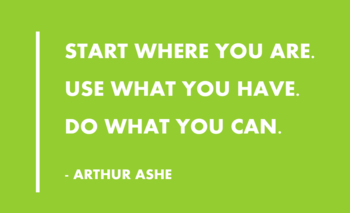The Mental Game of Being an Entrepreneur
 I’ve been feeling
I’ve been feeling a bit really overwhelmed lately. There’s so much to do if we want to complete development on our beta product to launch later this school year and yet, everything seems to take twice as long three times as long as I think it will.
This is usually when my inner gremlins start to kick in. But this morning, instead of letting the fear, doubt, and worry consume me, I printed out this quote from the great Arthur Ashe and put it on my wall next to my monitor.
 I love this quote. It reminds me that no matter how overwhelmed I feel, no matter how much work there is still to do, all I can do is start where I am, use what I have, and do what I can.
I love this quote. It reminds me that no matter how overwhelmed I feel, no matter how much work there is still to do, all I can do is start where I am, use what I have, and do what I can.
The mental game of being an entrepreneur is something I struggle with at times. Maybe it’s just me, but launching a startup can sometimes feel like riding an emotional roller coaster. One week, you get some good press, have a great meeting, or land that perfect opportunity, and you’re optimistic about your prospects! The next week, after a few days of bad news —the software update you thought was ready to roll out, in fact, is not ready or you spend days working on something that goes nowhere—you start wondering, what the heck am I doing?
Perhaps I was just naive in thinking that I’d be 100 percent gung-ho every day about my startup. And perhaps, I’m supposed to be. But that’s just not my experience. Here are the things I wish someone had told me about the mental game of being an entrepreneur:
 Highs and lows are normal. You can love love love your idea and product, but it’s normal to also have reservations sometimes and wonder if you can pull it off. Don’t take it as a negative sign when you feel these doubts, it’s just part of the process. In fact, doubts can be good for you, as they keep you honest and open to new ideas.
Highs and lows are normal. You can love love love your idea and product, but it’s normal to also have reservations sometimes and wonder if you can pull it off. Don’t take it as a negative sign when you feel these doubts, it’s just part of the process. In fact, doubts can be good for you, as they keep you honest and open to new ideas.
When you get bogged down, do something else. When something isn’t working, I have a tendency to want to double-down and try to brute-force my way through it. But I’ve learned that doing so is just a waste of time and energy. Now when I’m stuck on something—whether it’s fixing a bug or writing a blog post—I try to remember to take a break and go do something else on my to-do list. This isn’t easy, especially when the problem I’m trying to solve is urgent, but I’ve found that trying to “force” my way to a solution, tends to lead to a sub-optimal result, often creates more problems for later, and always leaves me feeling disenchanted with what I’m working on.
 Positive thinking matters a lot. If you don’t believe you can do it, no one else will. So it’s important to figure out ways to boost your own morale, especially if things aren’t going as well as you would like them to. I like to collect some of the positive reviews and emails that we’ve received from users to re-read when I’m feeling discouraged.
Positive thinking matters a lot. If you don’t believe you can do it, no one else will. So it’s important to figure out ways to boost your own morale, especially if things aren’t going as well as you would like them to. I like to collect some of the positive reviews and emails that we’ve received from users to re-read when I’m feeling discouraged.
Start tracking your productivity. This subject merits its own post, but I will say that tracking my hours the past few months (i.e., when/where I work, what I’m working on, and how effective and efficient I am) has really helped. I’ll go into details in a future post, but one of the main mental challenges for me is that when there’s too much to do and too little time, it can sometimes feel downright paralyzing. I’ve found that developing a better understanding of my workflow has helped me a lot in staying focused and engaged.
Okay, time to get back to work and to Arthur Ashe’s advice: start where I am, use what I have, and do what I can.
Until next time,
Have questions or feedback? Comment below or let me know on Twitter @professorword!
Photo Credit: Flickr users Bernard Goldbach, scartIssue, MartaZ
